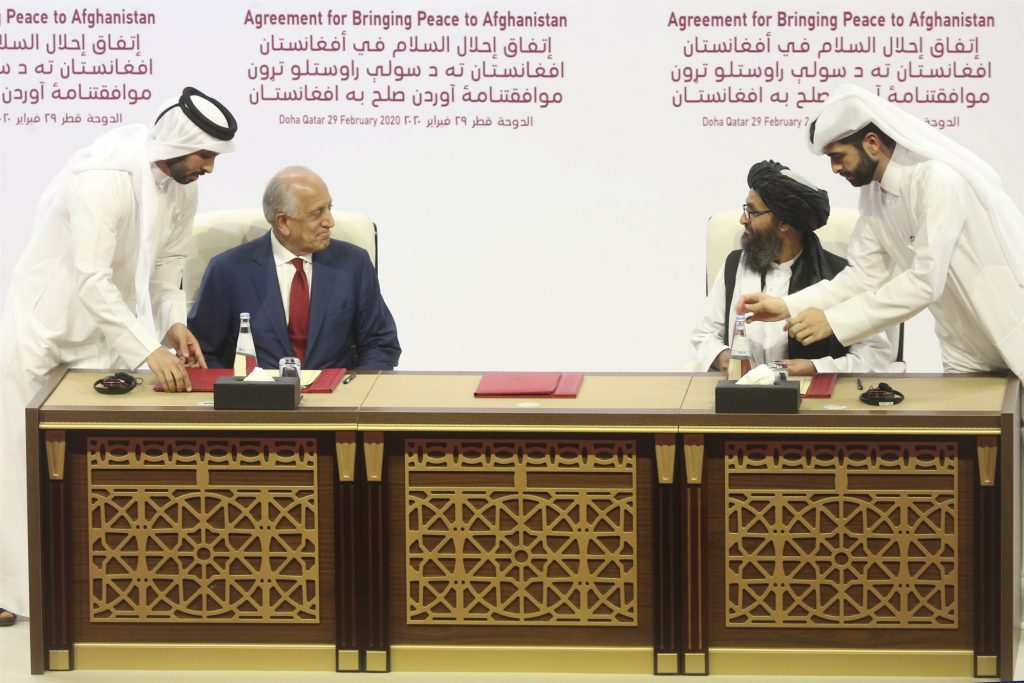
New Delhi. 29 February 2020. The wait got over and an agreement for bringing peace to Afghanistan between the Islamic Emirate of Afghanistan which is not recognized by the United States as a state and is known as the Taliban and the United States of America was signed today at Doha in the presence of US Secretary of State Mike Pompeo.
The agreement was signed by U.S. special envoy Zalmay Khalilzad and the Taliban’s chief negotiator and one of its founders, Mullah Abdul Ghani Baradar in the presence of leaders from Pakistan, Qatar, Turkey, India, Indonesia, Uzbekistan and Tajikistan. After 19 years, US will finally remove American troops from endless conflicts around the globe.
The United States is committed to withdraw from Afghanistan all military forces of the United States, its allies, and Coalition partners, including all non-diplomatic civilian personnel, private security contractors, trainers, advisors, and supporting services personnel within fourteen (14) months following announcement of this agreement.
“We are working to finally end America’s longest war and bring our troops back home,” said American President Donald Trump in an official White House statement.
The United States, its allies, and the Coalition will reduce the number of U.S. forces in Afghanistan to eight thousand six hundred (8,600) and proportionally bring reduction in the number of its allies and Coalition forces in the next 135 days. It will withdraw all forces from five (5) military bases.
The United States, its allies, and the Coalition will complete withdrawal of all remaining forces from Afghanistan within the remaining nine and a half (9.5) months. It will withdraw all forces from remaining bases.
The United States is committed to start immediately to work with all relevant sides on a plan to expeditiously release combat and political prisoners as a confidence building measure with the coordination and approval of all relevant sides. Up to five thousand (5,000) prisoners Taliban and up to one thousand (1,000) prisoners of the other side will be released by March 10, 2020, the first day of intra-Afghan negotiations.
The relevant sides have the goal of releasing all the remaining prisoners over the course of the subsequent three months. The United States commits to completing this goal. The Taliban commits that its released prisoners will be committed to the responsibilities mentioned in this agreement so that they will not pose a threat to the security of the United States and its allies.
With the start of intra-Afghan negotiations, the United States will initiate an administrative review of current U.S. sanctions and the rewards list against members of Taliban with the goal of removing these sanctions by August 27, 2020, which corresponds to Muharram.
With the start of intra-Afghan negotiations, the United States will start diplomatic engagement with other members of the United Nations Security Council and Afghanistan to remove members of the Islamic Emirate of Afghanistan which is not recognized by the United States as a state and is known as the Taliban from the sanctions list with the aim of achieving this objective by May 29, 2020.
The United States and its allies will refrain from the threat or the use of force against the territorial integrity or political independence of Afghanistan or intervening in its domestic affairs.
Taliban will not allow any of its members, other individuals or groups, including al-Qa’ida, to use the soil of Afghanistan to threaten the security of the United States and its allies. It will send a clear message that those who pose a threat to the security of the United States and its allies have no place in Afghanistan, and will instruct its members not to cooperate with groups or individuals threatening the security of the United States and its allies.
The Taliban will prevent any group or individual in Afghanistan from threatening the security of the United States and its allies, and will prevent them from recruiting, training, and fundraising and will not host them in accordance with the commitments in this agreement.
Taliban is committed to deal with those seeking asylum or residence in Afghanistan according to international migration law and the commitments of this agreement, so that such persons do not pose a threat to the security of the United States and its allies.
The Taliban will not provide visas, passports, travel permits, or other legal documents to those who pose a threat to the security of the United States and its allies to enter Afghanistan.
The United States will request the recognition and endorsement of the United Nations Security Council for this agreement. The United States and the Taliban seek positive relations with each other and expect that the relations between the United States and the new post-settlement Afghan Islamic government as determined by the intra-Afghan dialogue and negotiations will be positive.
The United States will seek economic cooperation for reconstruction with the new postsettlement Afghan Islamic government as determined by the intra-Afghan dialogue and negotiations, and will not intervene in its internal affairs.
A permanent and comprehensive ceasefire will be an item on the agenda of the intra-Afghan dialogue and negotiations. The participants of intra-Afghan negotiations will discuss the date and modalities of a permanent and comprehensive ceasefire, including joint implementation
mechanisms, which will be announced along with the completion and agreement over the future political roadmap of Afghanistan.
The United States and Afghan governments will be issuing a joint declaration reaffirming their strong partnership, including America’s continued support for Afghan security forces, said the statement. Meanwhile, the United States will continue working with allies and partners to monitor the situation and preserve the gains of the last 19 years.
































































































































